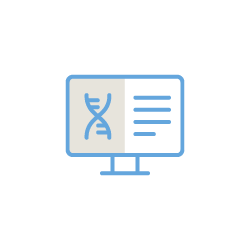Diagnose a broad range of metabolic disorders with a single test, Global MAPS®
Global MAPS® is a large scale, semi-quantitative metabolomic profiling screen that analyzes disruptions in both individual analytes and pathways related to biochemical abnormalities. Using state-of-the-art technologies, Global Metabolomic Assisted Pathway Screen (Global MAPS®) provides small molecule metabolic profiling to identify >700 metabolites in human plasma, urine, or cerebrospinal fluid. Global MAPS® identifies inborn errors of metabolism (IEMs) that would ordinarily require many different tests. This test defines biochemical pathway errors not currently detected by routine clinical or genetic testing.
IEMs are inherited metabolic disorders that prevent the body from converting one chemical compound to another or from transporting a compound in or out of a cell. These processes are necessary for essentially all bodily functions. Most IEMs are caused by defects in the enzymes that help process nutrients, which result in an accumulation of toxic substances or a deficiency of substances needed for normal body function. Making a swift, accurate diagnosis of an IEM and prescribing the appropriate diet or medication is critical in preventing brain damage, organ damage, and even death.
Global MAPS™ is a large scale, semi-quantitative metabolomic profiling screen that analyzes disruptions in both individual analytes and pathways related to biochemical abnormalities. Using state-of-the-art technologies, Global Metabolomic Assisted Pathway Screen (Global MAPS™) provides small molecule metabolic profiling to identify >700 metabolites in human plasma, urine, or cerebrospinal fluid. Global MAPS™ identifies inborn errors of metabolism (IEMs) that would ordinarily require many different tests. This test defines biochemical pathway errors not currently detected by routine clinical or genetic testing.
IEMs are inherited metabolic disorders that prevent the body from converting one chemical compound to another or from transporting a compound in or out of a cell. These processes are necessary for essentially all bodily functions. Most IEMs are caused by defects in the enzymes that help process nutrients, which result in an accumulation of toxic substances or a deficiency of substances needed for normal body function. Making a swift, accurate diagnosis of an IEM and prescribing the appropriate diet or medication is critical in preventing brain damage, organ damage, and even death.
Global MAPS™ is a unique broad screening test that can detect disorders involving metabolism of amino acids, organic acids, fatty acid oxidation, vitamin cofactors, pyrimidine biosynthesis, creatine biosynthesis, and urea cycle metabolism, among other known disorders.
Metabolites range in size and include, but are not limited to:
Global MAPS™ is a unique broad screening test that can detect disorders involving metabolism of amino acids, organic acids, fatty acid oxidation, vitamin cofactors, pyrimidine biosynthesis, creatine biosynthesis, and urea cycle metabolism, among other known disorders.
Metabolites range in size and include, but are not limited to:
Global Metabolomic Assisted Pathway Screen (Global MAPS®)
Test Code |
4900 |
4901 |
Specimen Type |
|
|
TAT (Days) |
21 |
21 |
AUTISM SPECTRUM DISORDER
DEVELOPMENTAL DELAY
VARIANTS OF UNCERTAIN CLINICAL SIGNIFICANCE IN A GENE KNOWN TO BE INVOLVED IN SMALL MOLECULE METABOLISM
FAILURE TO THRIVE
HYPOGLYCEMIA
HYPOTONIA
NON-SYNDROMIC INTELLECTUAL DISABILITY
RECURRENT VOMITING
SEIZURES
SPEECH/LANGUAGE DELAY
UNDIFFERENTIATED PHENOTYPE POSSIBLY RELATED TO PERTURBATION IN A BIOCHEMICAL PATHWAY
Global Metabolomic Assisted Pathway Screen (Global MAPS™)
Test Code |
4900 |
4901 |
4902 |
Specimen Type |
|||
TAT (Days) |
21 |
21 |
21 |
AUTISM SPECTRUM DISORDER
DEVELOPMENTAL DELAY
VARIANTS OF UNCERTAIN CLINICAL SIGNIFICANCE IN A GENE KNOWN TO BE INVOLVED IN SMALL MOLECULE METABOLISM
FAILURE TO THRIVE
HYPOGLYCEMIA
HYPOTONIA
NON-SYNDROMIC INTELLECTUAL DISABILITY
RECURRENT VOMITING
SEIZURES
SPEECH/LANGUAGE DELAY
UNDIFFERENTIATED PHENOTYPE POSSIBLY RELATED TO PERTURBATION IN A BIOCHEMICAL PATHWAY
Begin your discovery with Global MAPS®


SAMPLE TYPE |
REQUIREMENTS |
SHIPPING CONDITIONS |
|---|---|---|
|
Send 1-2 cc of plasma. Draw blood in an EDTA (purple top) tube(s) and separate plasma as soon as possible, freezing immediately. Store the specimen frozen at -20°C. Specimen may be stored frozen up to 7 days. |
Ship frozen sample in insulated container, with 3 -5 lbs. dry ice, by overnight courier. |
|
Send 3-5 cc of a random urine. Do not add preservatives. Store the specimen frozen at -20°C. |
Ship frozen sample in insulated container, with 3 -5 lbs. dry ice, by overnight courier. |

NO CONSENT IS REQUIRED FOR THIS TEST.
How It Works:
Order appropriate testing for your patient.
The patient’s sample is collected.
The patient’s sample is sent to Baylor Genetics.
Results are sent to the physician.
Discuss the results with the patient.
More questions? Please contact us by calling 1.800.411.4363.
De novo missense variant in the GTPase effector domain (GED) of DNM1L leads to static encephalopathy and seizures
Nurit Assia Batzir, Christine M. Eng, Alica M. Goldman, Pranjali K. Bhagwat, Tanya N. Eble, Pengfei Liu, Laurie A. Robak, Fernando Scaglia, Sarah H. Elsea, Shweta U. Dhar, and Michael F. Wangler. De novo missense variant in the GTPase effector domain (GED) of DNM1L leads to static encephalopathy and seizures. Genome Med 11, 12. Jun 2019 PMID: 30850373
Metabolomics in the clinic: A review of the shared and unique features of untargeted metabolomics for clinical research and clinical testing
Adam D. Kennedy, Bryan M. Wittmann, Anne M. Evans, Luke A.D. Miller, Douglas R. Toal, Shaun Lonergan, Sarah H. Elsea and Kirk L. Pappan. Metabolomics in the clinic: A review of the shared and unique features of untargeted metabolomics for clinical research and clinical testing. J Mass Spectrom. Nov 2018. PMID: 30242936
Case report and novel treatment of an autosomal recessive Leigh syndrome caused by short-chain enoyl-CoA hydratase deficiency.
Brian J. Shayota, Claudia Soler‐Alfonso, Mir Reza Bekheirnia, Elizabeth Mizerik, Suzy W. Boyer, Rui Xiao, Yaping Yang, Sarah H. Elsea, Fernando Scaglia. Case report and novel treatment of an autosomal recessive Leigh syndrome caused by short‐chain enoyl‐CoA hydratase deficiency. American Journal of Medical Genetics Association. Mar. 2019. PMID: 30848071
Disturbed phospholipid metabolism in serine biosynthesis defects revealed by metabolomic profiling
Kevin E. Glinton, Paul J. Benke, Matthew A. Lines, Michael T. Geraghty, Pranesh Chakraborty, Osama Y. Al-Dirbashi, Yi Jiang, Adam D. Kennedy, Michael S. Grotewiel, V. Reid Sutton, Sarah H. Elsea, Ayman W. El-Hattab. Disturbed phospholipid metabolism in serine biosynthesis defects revealed by metabolomic profiling. Molecular Genetics and Metabolism Reports. Mar 2018; PMID: 29269105
Untargeted metabolomics identifies unique though benign biochemical changes in patients with pathogenic variants in UROC1.
Kevin E.Glinton, Harvey L.Levy, Adam D.Kennedy, Kirk L.Pappan, Sarah H.Elsea. Untargeted metabolomics identifies unique though benign biochemical changes in patients with pathogenic variants in UROC1. Molecular Genetics and Metabolism Reports. Mar 2019; PMID: 30619714
Opening a window on lysosomal acid lipase deficiency: Biochemical, molecular, and epidemiological insights
Analyses of SLC13A5-epilepsy patients reveal perturbations of TCA cycle
Bainbridge MN, Cooney E, Miller M, Kennedy AD, Wulff JE, Donti T, Jhangiani SN, Gibbs RA, Elsea SH, Porter BE, Graham BH. Analyses of SLC13A5-epilepsy patients reveal perturbations of TCA cycle. Mol Genet Metab. 2017 Aug;121(4):314-319. Epub 2017 Jun 24. PMID: 28673551
Clinical Metabolomics to Segregate Aromatic Amino Acid Decarboxylase Deficiency From Drug-Induced Metabolite Elevations
Pappan KL, Kennedy AD, Magoulas PL, Hanchard NA, Sun Q, Elsea SH. Clinical Metabolomics to Segregate Aromatic Amino Acid Decarboxylase Deficiency From Drug-Induced Metabolite Elevations. Pediatr Neurol. 2017 Oct;75:66-72. Epub 2017 Jun 29. PMID: 28823629
Elucidation of the complex metabolic profile of cerebrospinal fluid using an untargeted biochemical profiling assay
Kennedy AD, Pappan KL, Donti TR, Evans AM, Wulff JE, Miller LAD, Reid Sutton V, Sun Q, Miller MJ, Elsea SH. Elucidation of the complex metabolic profile of cerebrospinal fluid using an untargeted biochemical profiling assay. Mol Genet Metab. 2017 Apr 9. PMID: 28412083
Analytes related to erythrocyte metabolism are reliable biomarkers for preanalytical error due to delayed plasma processing in metabolomics studies
Jain M, Kennedy AD, Elsea SH, Miller MJ. Analytes related to erythrocyte metabolism are reliable biomarkers for preanalytical error due to delayed plasma processing in metabolomics studies. Clin Chim Acta. 2017 Mar;466:105-111. PMID: 28069401
Homozygous variants in pyrroline-5-carboxylate reductase 2 (PYCR2) in patients with progressive microcephaly and hypomyelinating leukodystrophy
Meng L, Donti T, Xia F, Niu Z, Al Shamsi A, Hertecant J, Al-Jasmi F, Gibson JB, Nagakura H, Zhang J, He W, Eng C, Yang Y, Elsea SH. Homozygous variants in pyrroline-5-carboxylate reductase 2 (PYCR2) in patients with progressive microcephaly and hypomyelinating leukodystrophy. Am J Med Genet A. 2017 Feb;173(2):460-470. PMID: 27860360
Metabolomic Profiling of Human Urine as a Screen for Multiple Inborn Errors of Metabolism
Kennedy AD, Miller MJ, Beebe K, Wulff JE, Evans AM, Miller LA, Sutton VR, Sun Q, Elsea SH. Metabolomic Profiling of Human Urine as a Screen for Multiple Inborn Errors of Metabolism. Genet Test Mol Biomarkers. 2016 Sep;20(9):485-95. PMID: 27448163
Elevations of C14:1 and C14:2 Plasma Acylcarnitines in Fasted Children: A Diagnostic Dilemma
Burrage LC, Miller MJ, Wong LJ, Kennedy AD, Sutton VR, Sun Q, Elsea SH, Graham BH. Elevations of C14:1 and C14:2 Plasma Acylcarnitines in Fasted Children: A Diagnostic Dilemma. J Pediatr. 2016 Feb;169:208-13.e2. PMID: 26602010
Untargeted metabolomic analysis for the clinical screening of inborn errors of metabolism
Miller MJ, Kennedy AD, Eckhart AD, Burrage LC, Wulff JE, Miller LA, Milburn MV, Ryals JA, Beaudet AL, Sun Q, Sutton VR, Elsea SH. Untargeted metabolomic analysis for the clinical screening of inborn errors of metabolism. J Inherit Metab Dis. 2015 Nov;38(6):1029-39. PMID: 25875217
Aromatic L-amino acid decarboxylase deficiency diagnosed by clinical metabolomic profiling of plasma
Atwal PS, Donti TR, Cardon AL, Bacino CA, Sun Q, Emrick L, Reid Sutton V, Elsea SH. Aromatic L-amino acid decarboxylase deficiency diagnosed by clinical metabolomic profiling of plasma. Mol Genet Metab. 2015 Jun-Jul;115(2-3):91-4. PMID: 25956449







